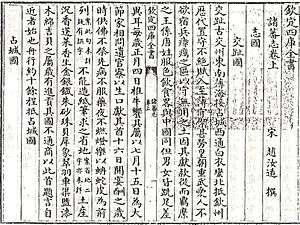Zhao Rukuo
Zhao Rukuo[1][2] (simplified Chinese: 赵汝适; traditional Chinese: 趙汝适; pinyin: Zhào Rǔkuò; 1170–1231), also read as Zhao Rugua,[3] or misread as Zhao Rushi,[4] was a Chinese historian and politician during the Song dynasty. He wrote a two-volume book titled Zhu Fan Zhi. The book deals with the world known to the Chinese in the twelfth and thirteenth centuries;[5] the first volume is a list of foreign places with descriptions of each place and the customs of its local people.[6] The second volume is a catalog of trade goods.
Biography
Zhao was a member of the Song Dynasty imperial clan, an eighth-generation descendant of Emperor Taizong in the lineage through the younger brother of Emperor Zhenzong.[7][8] He was born in Tiantai County in Taizhou, Zhejiang in 1170.[9] He began his career as a bureaucrat in 1190, and rose through the rank. In 1224, he was appointed the supervisor of maritime trade (市舶司, shibosi) in Quanzhou, Fujian province.[10] He also held the posts of prefect for Quanzhou as well the southern administrator.[11] He died in 1231 and was buried in Linhai County in Zhejiang.[9]
Zhu Fan Zhi

While working in Fujian, Zhao noted the commodities from various countries, and he had the opportunity to meet foreign merchants from whom he gathered information on various countries around the world. He also studied maps, and with the information that he collected, he wrote the book, which he finished around 1225.[7] Many entries of Zhu Fan Zhi take information from an older work from 1178, Lingwai Daida by another geographer, Zhou Qufei (Chinese: 周去非; pinyin: Zhōu Qùfēi; Wade–Giles: Chou Ch'ü-fei). However, a significant part of the book came from what he gathered from foreign and Chinese traders.[7]
Although Zhao had not travelled outside of China, the book contained valuable information on various countries in the 13th century for modern scholars.[12]The countries ranged from those nearby such as Japan, to the various kingdoms in South East Asia, such as Srivijaya and Bruneian Empire, places in India, to the Islamic heartland of Arabia and Mecca, as well as countries in Africa, and as far as southern Spain.[13]
See also
References
- Chengda Fan, James M Hargett (2011). Treatises of the Supervisor and Guardian of the Cinnamon Sea: The Natural World and Material Culture of Twelfth-century China. University of Washington Press. ISBN 978-0295990798.
- "Zhao Rukuo". Encyclopædia Britannica.
- Hyunhee Park (2012). Mapping the Chinese and Islamic Worlds: Cross-Cultural Exchange in Pre-Modern Asia. Cambridge University Press. pp. 50–52. ISBN 978-1107018686.
- Zheng Yangwen (2011). China on the Sea: How the Maritime World Shaped Modern China. Brill. p. 209. ISBN 978-9004194779.
- "Old Chinese Book Tells of the World 800 Years Ago; Chau-Ju-Kua's Chronicles of the Twelfth Century, Now First Translated, Give a "Description of Barbarous Peoples Picked Up by This Noted Inspector of Foreign Trade and Descendant of Emperors". New York Times. December 29, 2012.
- Cœdès, George (1968). The Indianized states of Southeast Asia. University of Hawaii Press. p. 186. ISBN 9780824803681.
- Anshan Li (6 April 2012). A History of Overseas Chinese in Africa to 1911. Diasporic Africa Press. p. 30. ISBN 978-0966020106.
- Friedrich Hirth, William Woodville Rockhill. Chau Ju-kua: His Work On The Chinese And Arab Trade In The Twelfth And Thirteenth Centuries, Entitled Chu-fan-chï. p. 35.
- "人物传". fjsq.gov.cn (in Chinese). Archived from the original on 15 September 2009.
- Don J. Wyatt (2011). The Blacks of Premodern China. University of Pennsylvania Press. p. 35. ISBN 9780812203585.
- Tasha Vorderstrasse (14 May 2014). Paul Cobb (ed.). The Lineaments of Islam: Studies in Honor of Fred McGraw Donner. Brill. p. 459. ISBN 9789004231948.
- Don J. Wyatt (2011). The Blacks of Premodern China. University of Pennsylvania Press. p. 36. ISBN 9780812203585.
- Valerie Hansen, Kenneth R. Curtis. Voyages in World History. pp. 267–270.